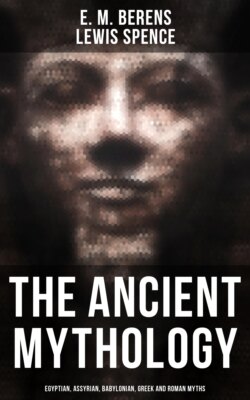Читать книгу The Ancient Mythology: Egyptian, Assyrian, Babylonian, Greek and Roman Myths - Lewis Spence - Страница 40
На сайте Литреса книга снята с продажи.
Type of Babylonian Cosmology
ОглавлениеWe must now consider the precise nature of the Babylonian cosmology and its place among other creation myths. Like the cosmological efforts of most primitive or barbarian peoples it does not partake of the character of a creation myth so much as an account of an evolution from chaos and the establishment of physical laws. The primitive mind cannot grasp the idea of the creation of something out of nothing, and the Babylonians and Akkadians did not differ in this respect from other races in the same stage of development. In whatever direction we look when examining the cosmologies of barbarian or semi-civilized peoples, we find a total inability to get behind and beyond the idea that the matter of creation lay already to the hand of the creative agency, and that in order to shape a world it had but to draw the material therefor from the teeming deep or the slain body of a hostile monster. Not only does the idea of creating land and water out of nothingness seem absurd to the primitive mind, but man as well must be framed from dust, mud, clay, or the blood of the creative god himself. Yet Merodach was able to bring a garment out of nothingness and to return it thither by merely speaking a word! Why, then, did not the theology which admitted the possibility of such a phenomenon carry out its own conception to a logical conclusion and own the likelihood of the god's ability to create an entire universe in the self-same manner? Perhaps the step was too bold for an individual to take in the face of an entire theological college, and in any case what would seem a perfectly feasible act of magic to the theologians of Babylon when applied to a garment might not serve for application to the making of the earth and all that is therein. The cosmology of Babylon is therefore on a par with those of Scandinavia, China, and many North American Indian tribes, nor does it reach so high an imaginative level as those of ancient Egypt, India, or the Maya of Central America, in some of which the vocal command of a god is sufficient to bring about the creation of the earth and the waters surrounding it.
The making of the sun, the moon, and the other heavenly bodies is, as will be more fully shown later, of great importance in Babylonian myth. The stars appear to have been attached to the firmament of heaven as to a cloth. Across this the sun passed daily, his function being to inspect the movements of the other heavenly bodies. The moon, likewise, had her fixed course, and certain stars were also supposed to move across the picture of the night with greater or less regularity. The heavens were guarded at either end by a great gateway, and through one of these the sun passed after rising from the ocean, whilst in setting he quitted the heavens by the opposite portal.
The terrestrial world was imagined as a great hollow structure resting on the 'deep.' Indeed, it would seem to have been regarded as an island floating on an abyss of waters. This conception of the world of earth was by no means peculiar to the Babylonians, but was shared by them with many of the nations of antiquity.
As emanating from the blood of Merodach himself, man was looked upon as directly of heavenly origin. An older tradition existed to the effect that Merodach had been assisted in the creation of mankind by the goddess Aruru, who figures in the Gilgamesh epic as the creatress of Eabani out of a piece of clay. We also find an ancient belief current that humanity owed its origin to the god Ea, but when Merodach displaced this god politically, he would, of course, 'take over' his entire record and creative deeds as well as his powers and sovereignties. At Nippur Bel was looked up to as the originator of man. But these beliefs probably obtained in remoter times, and would finally be quenched by the advance to full and unquestioned power of the great god Merodach.
